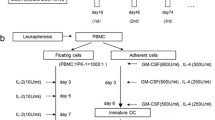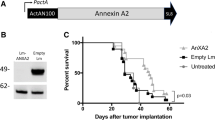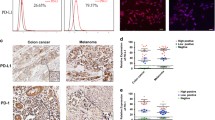Abstract
A substantial body of evidence suggests the existence of MUC1-specific antibodies and cytotoxic T cell activities in pancreatic cancer patients. However, tumor-induced immunosuppression renders these responses ineffective. The current study explores a novel therapeutic combination wherein tumor-bearing hosts can be immunologically primed with their own antigen, through opsonization with a tumor antigen-targeted antibody, mAb-AR20.5. We evaluated the efficacy of immunization with this antibody in combination with PolyICLC and anti-PD-L1. The therapeutic combination of mAb-AR20.5 + anti-PD-L1 + PolyICLC induced rejection of human MUC1 expressing tumors and provided a long-lasting, MUC1-specific cellular immune response, which could be adoptively transferred and shown to provide protection against tumor challenge in human MUC1 transgenic (MUC.Tg) mice. Furthermore, antibody depletion studies revealed that CD8 cells were effectors for the MUC1-specific immune response generated by the mAb-AR20.5 + anti-PD-L1 + PolyICLC combination. Multichromatic flow cytometry data analysis demonstrated a significant increase over time in circulating, activated CD8 T cells, CD3+CD4−CD8−(DN) T cells, and mature dendritic cells in mAb-AR20.5 + anti-PD-L1 + PolyICLC combination-treated, tumor-bearing mice, as compared to saline-treated control counterparts. Our study provides a proof of principle that an effective and long-lasting anti-tumor cellular immunity can be achieved in pancreatic tumor-bearing hosts against their own antigen (MUC1), which can be further potentiated using a vaccine adjuvant and an immune checkpoint inhibitor.






Similar content being viewed by others
Abbreviations
- ADCC:
-
Antibody-dependent cell-mediated cytotoxicity
- ANOVA:
-
Analysis of variance
- BSA:
-
Bovine serum albumin
- CFSE:
-
Carboxyfluorescein succinimidyl ester
- DN T cells:
-
Double negative T cells
- ELISA:
-
Enzyme-linked immunosorbent assay
- FACS:
-
Fluorescence-activated cell sorting
- gp:
-
Group
- γδT cells:
-
Gamma delta T cells
- GVAX:
-
Granulocyte-macrophage colony-stimulating factor (GM-CSF) gene-transfected tumor cell vaccine
- HLA-DR:
-
Human leukocyte antigen–antigen D related
- IACUC:
-
Institutional Animal Care and Use Committee
- IFN-γ:
-
Interferon gamma
- i.p :
-
Intraperitoneal injection
- iNKT cells:
-
Invariant natural killer T cells
- KPC:
-
LSL-KrasG12D/+; LSL-Trp53R172H/+; Pdx-1-Cre
- KPC.MUC1:
-
KPC tumors expressing human MUC1
- LAG-3:
-
Lymphocyte activation gene 3
- MFI:
-
Mean fluorescence intensity
- MHC:
-
Major histocompatibility complex
- MsIgG1:
-
Mouse IgG1
- MUC1:
-
Mucin 1
- MUC1.Tg:
-
Human MUC1 transgenic
- NK cells:
-
Natural killer cells
- PDAC:
-
Pancreatic ductal adenocarcinoma
- PD-1:
-
Programmed cell death protein 1
- PD-L1:
-
Programmed death-Ligand 1
- PMA:
-
Phorbol 12-myristate 13-acetate
- PolyICLC:
-
Polyinosinic-polycytidylic acid
- TCR:
-
T-cell receptor
- TILs:
-
Tumor-infiltrating lymphocytes
- TLR3:
-
Toll-like receptor 3
- TTP:
-
Time-to-tumor progression
- Type 1 IFN:
-
Type 1 interferon
References
Kotera Y, Fontenot JD, Pecher G, Metzgar RS, Finn OJ (1994) Humoral immunity against a tandem repeat epitope of human mucin MUC-1 in sera from breast, pancreatic, and colon cancer patients. Cancer Res 54:2856–2860
Barnd DL, Lan MS, Metzgar RS, Finn OJ (1989) Specific, major histocompatibility complex-unrestricted recognition of tumor-associated mucins by human cytotoxic T cells. PNAS 86:7159–7163
Heller A, Zornig I, Muller T et al (2010) Immunogenicity of SEREX-identified antigens and disease outcome in pancreatic cancer. Cancer Immunol Immunother 59:1389–1400
Le DT, Wang-Gillman A, Picozzi V, Greten TF et al (2015) Saftey and survival with GVAX pancreas prime and Listeria Monocytogenes-expressing mesothelin (CRS-207) boost vaccines for metastatic pancreatic cancer. J Clin Oncol 33:1325–1333
Beatty GL, Chiorean EG, Fishman MP et al (2011) CD40 agonists alter tumor stroma and show efficacy against pancreatic carcinoma in mice and humans. Science 331:1612–1616
Brahmer JR, Tykodi SS, Chow LQ et al (2012) Safety and activity of anti-PD-L1 antibody in patients with advanced cancer. N Engl J Med 366:2455–2465
Royal RE, Levy C, Turner K et al (2010) Phase 2 trial of single agent Ipilimumab (anti-CTLA-4) for locally advanced or metastatic pancreatic adenocarcinoma. J Immunother 33:828–833
de Bono JS, Rha SY, Stephenson J et al (2004) Phase I trial of a murine antibody to MUC1 in patients with metastatic cancer: evidence for the activation of humoral and cellular antitumor immunity. Ann Oncol 15:1825–1833
Rowse GJ, Tempero RM, VanLith ML, Hollingsworth MA, Gendler SJ (1998) Tolerance and immunity to MUC1 in a human MUC1 transgenic murine model. Cancer Res 58:315–321
Morikane K, Tempero R, Sivinski CL, Kitajima S, Gendler SJ, Hollingsworth MA (2001) Influence of organ site and tumor cell type on MUC1-specific tumor immunity. Int Immunol 13:233–40
Tempero RM, VanLith ML, Morikane K, Rowse GJ, Gendler SJ, Hollingsworth MA (1998) CD4+ lymphocytes provide MUC1-specific tumor immunity in vivo that is undetectable in vitro and is absent in MUC1 transgenic mice. J Immunol 161:5500–5506
Qi W, Schultes BC, Liu D, Kuzma M, Decker W, Madiyalakan R (2001). Characterization of an anti-MUC1 monoclonal antibody with potential as a cancer vaccine. Hybrid Hybridomics 20:313–324
Bunt SK, Mohr AM, Bailey JM, Grandgenett PM, Hollingsworth MA (2013) Rosiglitazone and gemcitabine in combination reduces immune suppression and modulates T cell populations in pancreatic cancer. Cancer Immunol Immunother 62:225–236
Riches JC, Davies JK, McClanahan F et al (2013) T cells from CLL patients exhibit features of T-cell exhaustion but retain capacity for cytokine production. Blood 121:1612–1621
Karagiannis SN, Wang Q, East N et al (2003) Activity of human monocytes in IgE antibody-dependent surveillance and killing of ovarian tumor cells. Eur J Immunol 33:1030–1040
Chen L, Han X (2015) Anti-PD-1/PD-L1 therapy of human cancer: past, present, and future. J Clin Invest 125:3384–3391
Pauken KE, Wherry EJ (2015) Overcoming T cell exhaustion in infection and cancer. Trends Immunol 36:265–276
Duraiswamy J, Freeman GJ, Coukos G (2013) Therapeutic PD-1 pathway blockade augments with other modalities of immunotherapy T-cell function to prevent immune decline in ovarian cancer. Cancer Res 73:6900–6912
Zitvogel L, Galluzzi L, Kepp O, Smyth MJ, Kroemer G (2015) Type I interferons in anticancer immunity. Nat Rev Immunol 15:405–414
Ibrahim NK, Yariz KO, Bondarenko I et al (2011) Randomized phase II trial of letrozole plus anti-MUC1 antibody AS1402 in hormone receptor-positive locally advanced or metastatic breast cancer. Clin Cancer Res 17:6822–6830
Roulois D, Gregoire M, Fonteneau JF (2013) MUC1-specific cytotoxic T lymphocytes in cancer therapy: induction and challenge. Biomed Res Int. https://doi.org/10.1155/2013/871936
Schultes B, Hou F, Smith L, Nicodemus C (2007) Immunization with MUC1-anti-MUC1 immune complexes induces CD4 and CD8 T cell responses and provides tumor control in MUC1-tg mice. In: AACR annual meeting proceedings. Cancer Res 67 (Abstr 5097)
Schultes BC, Eng H, Agopsowicz K, Nicodemus CF (2004) Potent helper and cytolytic T cell response by dendritic cells armed with MUC1-anti-MUC1 immune complexes. In: 12th International congress of immunology and 4th annual conference of FOCIS, CIM, 27(4) (Abstr 53.102)
Schultes BC, Kuzma ML, Agopsowicz K et al (2002) Antibodies as vaccines immune complexes allow for efficient uptake and processing of antigens on MHC class I and II and induce maturation of dendritic cells. Experimental biology (AAI meeting). FASEB J 16:A334 (Abstr 246.12).
Mukherjee P, Basu GD, Tinder TL et al (2009) Progression of pancreatic adenocarcinoma is significantly impeded with a combination of vaccine and COX-2 inhibition. J Immunol 182:216–224
Mortenson ED, Park S, Jiang Z, Wang S, Fu YX (2013) Effective anti-neu-initiated antitumor responses require the complex role of CD4+ T cells. Clin Cancer Res 19:1476–1486
Rafiq K, Bergtold A, Clynes R (2002) Immune complex-mediated antigen presentation induces tumor immunity. J Clin Invest 110:71–79
Tumeh PC, Harview CL, Yearley JH et al (2014) PD-1 blockade induces responses by inhibiting adaptive immune resistance. Nature 515:568–571
Soares KC, Rucki AA, Wu AA et al (2015) PD-1/PD-L1 blockade together with vaccine therapy facilitates effector T-cell infiltration into pancreatic tumors. J Immunother 38:1–11
Topalian SL, Drake CG, Pardoll DM (2015) Immune checkpoint blockade: a common denominator approach to cancer therapy. Cancer Cell 27:450–461
Postow MA, Callahan MK, Wolchok JD (2015) Immune checkpoint blockade in cancer therapy. J Clin Oncol 33:1974–1982
Gajewski TF, Corrales L (2015) New perspectives on type I IFNs in cancer. Cytokine Growth Factor Rev 26:175–178
Nagato T, Lee YR, Harabuchi Y, Celis E (2014) Combinatorial immunotherapy of polyinosinic-polycytidylic acid and blockade of programmed death-ligand 1 induce effective CD8 T-cell responses against established tumors. Clin Cancer Res 20:1223–1234
Kohlgraf KG, Gawron AJ, Higashi M et al (2004) Tumor-specific immunity in MUC1.Tg mice induced by immunization with peptide vaccines from the cytoplasmic tail of CD227 (MUC1). Cancer Immunol Immunother 53:1068–1084
D’Acquisto F, Crompton T (2011) CD3+ CD4−CD8−(double negative) T cells: saviours or villains of the immune response? Biochem Pharmacol 82:333–340
Young KJ, Kay LS, Phillips MJ, Zhang L (2003) Antitumor activity mediated by double-negative T cells. Cancer Res 63:8014–8021
Gomes AQ, Martins DS, Silva-Santos B (2010) Targeting gamma delta T lymphocytes for cancer immunotherapy: from novel mechanistic insight to clinical application. Cancer Res 70:10024–10027
Seidel UJ, Vogt F, Grosse-Hovest L, Jung G, Handgretinger R, Lang P (2014) gamma delta T cell-mediated antibody-dependent cellular cytotoxicity with CD19 antibodies assessed by an impedance-based label-free real-time cytotoxicity assay. Front Immunol 5:618
Hossain MS, Takimoto H, Ninomiya T et al (2000) Characterization of CD4– CD8– CD3+ T-cell receptor-alpha beta + T cells in murine cytomegalovirus infection. Immunology 101:19–29
van der Vliet HJ, Molling JW, Nishi N et al (2003) Polarization of Valpha24+ Vbeta11+ natural killer T cells of healthy volunteers and cancer patients using alpha-galactosylceramide-loaded and environmentally instructed dendritic cells. Cancer Res 63:4101–4106
Deniger DC, Moyes JS, Cooper LJ (2014) Clinical applications of gamma delta T cells with multivalent immunity. Front Immunol 5:636
Gao Y, Yang W, Pan M et al (2003) Gamma delta T cells provide an early source of interferon gamma in tumor immunity. J Exp Med 198:433–442
Wesch D, Beetz S, Oberg HH, Marget M, Krengel K, Kabelitz D (2006) Direct costimulatory effect of TLR3 ligand poly(I:C) on human gamma delta T lymphocytes. J Immunol 176:1348–1354
Pylayeva-Gupta Y, Das S, Handler JS et al (2016) IL35-producing b cells promote the development of pancreatic neoplasia. Cancer Discov 6:247–255
Vogelstein B, Papadopoulos N, Velculescu VE, Zhou S, Diaz LA Jr, Kinzler KW (2013) Cancer genome landscapes. Science 339:1546–1558
Author information
Authors and Affiliations
Corresponding author
Ethics declarations
Conflict of interest
The authors have no conflict of interest.
Funding
This study was supported by the grants from the National Cancer Institute (CA127297, CA163120, CA036727, and CA163649). Kamiya Mehla is supported by Project Purple Jayne Snyder Pancreatic Cancer Research Fellowship Grant.
Electronic supplementary material
Below is the link to the electronic supplementary material.
Rights and permissions
About this article
Cite this article
Mehla, K., Tremayne, J., Grunkemeyer, J.A. et al. Combination of mAb-AR20.5, anti-PD-L1 and PolyICLC inhibits tumor progression and prolongs survival of MUC1.Tg mice challenged with pancreatic tumors. Cancer Immunol Immunother 67, 445–457 (2018). https://doi.org/10.1007/s00262-017-2095-7
Received:
Accepted:
Published:
Issue Date:
DOI: https://doi.org/10.1007/s00262-017-2095-7




